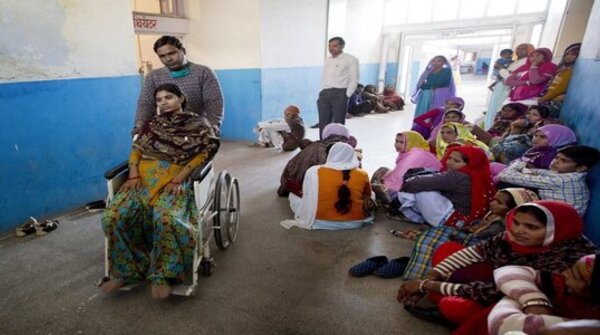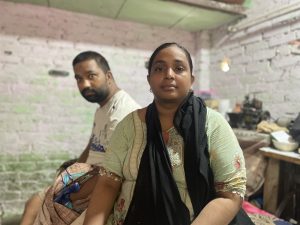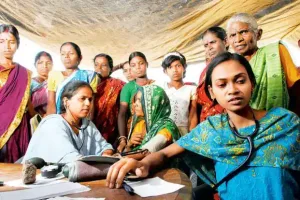Mass Sterilisation Camps Violate Norms And Fail Women’s Health Needs In Chhattisgarh

On August 26th, 2021, Dr Jibnus Ekta performed tubectomies on 101 women in a span of seven hours between 8 PM and 3 AM, at a mass sterilisation camp held at the Narmadapur Community Health Center (NHMC) in Surguja (Ambikapur) district in northern Chhattisgarh. This meant that each operative procedure took not more than 4.2 minutes. After the procedure, the women were made to rest on rugged mats for ten to fifteen minutes and then sent back home. These women, mostly Adivasi, belonged to Mainpat and Sitapur blocks of the district.
The mass sterilisation camp at NHMC violates government guidelines and standards, which stipulate that no more than 30 surgeries can be conducted in a day, and between 9 AM and 4 PM.
All the women who were operated upon are ‘healthy and sound’, said Alok Shukla,the health secretary of Chhattisgarh. However, he has ordered an inquiry as government norms had been flouted.
Following the incident, Poonam Singh Sisodia, the Chief Medical and Health Officer (CMHO) of Surguja sent a show-cause notice to Dr Jibnus Ekta and Dr RS Singh, the Block Medical Officer (BMO) of Mainpat district, who was present at the camp. Sisodia also constituted a three-member enquiry committee to investigate the matter and said that if found guilty, strict action would be taken against the doctors.
The Narmadapur mass sterilisation camp has once again brought forth the many issues in delivery of contraceptive services in Chhattisgarh – a state with a long standing history of botched sterilisations. A similar mass sterilisation camp held at Nemichand Jain hospital, a non-functional private health facility in Bilaspur in 2014, where sterilisation procedures were performed upon 83 women in six hours, had led to the death of 13 women. Dr R K Gupta, the then Block Medical Officer (BMO), who performed these surgeries in violation of all government norms, cited departmental pressure to meet the targets and use of substandard medicines as the reason for the deaths of the women. In 2017, the Bilaspur High Court ordered that all charges against Gupta be dropped.
In Devika Biswas versus Union of India and Others, the Supreme Court found mass sterilisation camps to be violative of women’s fundamental right to health and reproductive rights under Article 21 of the Constitution (Protection of Life and Personal Liberty). In 2016, the SC ordered the Union of India to ensure that the practice of conducting sterilization camps is discontinued within three years from the date of the judgement in any case. The court had also directed both the Union and the State government’s to ensure that this is done along with a strengthening of Primary Health Centres (PHCs), both in terms of infrastructure and accessibility of health care to all persons.
The continued violation of Standard Operating Procedures and other guidelines despite multiple botched sterilisations, points to a failure of planning and monitoring systems of sterilisation services in the state. The state government has also failed to address the high unmet need for family planning services and its disproportionate burden on women. Additionally, the lack of adequate health infrastructure, especially in tribal areas, adds to the vulnerability of Adivasi women.
Violation Of Norms
The Family Planning Division of the Ministry of Health and Family Welfare issued detailed Standard Operating Procedures for Sterilization Services in Camps in March 2008. Among the many provisions, it states that a surgeon should restrict themselves to conducting a maximum of 30 operative procedures in a day.
The SOP also stipulates that the camp timings should preferably be between 9 AM and 4 PM – a duration of 7 hours. According to media reports, the NMHC camp was reportedly held from 8 PM to 3 AM at night, in violation of the SOPs. The CMHO, however, claims that the surgeries were done between 12 noon and 6.30 PM in the evening.
Media reports also claim that the women were asked to rest on rugged mats for 10-15 minutes after the procedure before they were sent back home. This is a violation of MFHW’s Standards for Female and Male Sterilization Services (October 2006) which states that the patient can only be discharged after they have waited for at least 4 hours after the procedure, after monitoring for the stability of their vital signs and evaluation by a doctor.
The standards also stipulate that a signed consent letter from the patient stating that they had made aware of post-operative complications and that it was a permanent contraceptive method be obtained. However, local activists told Behanbox that women in Surguja were not apprised of the consent form or possible consequences of the procedure.
“The family members told us that they were made to sign consent letters while they were being discharged. They confused these consent letters with some form of registration document, discharge slip or a sterilisation certificate and signed them,” said Chandrakant, a local activist who works with Astha Samiti Sangathan, a non-governmental organisation (NGO) that works towards empowering rural and Adivasi population based in Kabirdham.
“Over the years, the dignity of women at these sterilisation camps has been consistently ignored. Women are made to lie on the floor in unhygienic conditions despite the provision of multiple SOPs, Quality Assurance Guidelines, and committees at the state and district level to monitor the implementation of these guidelines,” said Amulya Nidhi, national co-convenor of Jan Swathya Abhiyan, a national network of civil society organizations and people’s movements working for equitable health rights.
Amulya Nidhi believes both the mass sterilisation incidents at Bilaspur (2014) and the Surguja camp (2021) are a result of the government’s inability to plan and implement.
“Even now the blame is being shifted on to the surgeon. However, this is a case of failed planning. On the contrary, all the officers – from the block to the state level – who had planned and organised the camp must be held accountable,” he said.
The surgeon, Dr. Ekta claimed that a large number of women had turned up and they pressured him into performing the operations, saying that they had travelled long distances and it would be difficult for them to come again.
Sulakshana Nandi, the National Joint Convener of Jan Swasthya Abhiyan, told Behanbox that while this does not justify his decision to exceed the stipulated number of surgeries, it points to the fact that the government had failed to take stock of the situation.
“The need for contraceptive services increased because of disruption of services during the lockdown. Now that services are functional, the demand would obviously be very high. There is a lack of planning and coordination by the health department at all levels in addressing this demand. And women bear the brunt of it”, Nandi told Behanbox. “If not operated upon, it gives rise to unwanted pregnancies and other reproductive health issues. And when they do avail the services they’re treated in an inhumane manner”.
Rajaram Vastrakar, who lost his wife in the Bilaspur incident of 2014, agrees.
“The administration should have planned in advance to tackle the situation. They forget that there’s a human cost of their negligence”, he told Behanbox.
Vastrakar’s wife, Neera, died when their youngest daughter was seven months old.
“Since then I have brought her up alone. The government made some provisions but I have to face these issues all by myself,” he said. Except his eldest daughter, who was 18 years old at the time of the death of her mother, the other children – two daughters and a son – received a fixed deposit (FD) of INR 3 lakhs each, which will mature on February 28, 2025.
Unmet Need For Family Planning
According to data from the fourth round of National Family Health Survey (NFHS-4), the total unmet need for family planning in India stood at 12.9%. In Chhattisgarh, this was 11.1%. This was exacerbated during the pandemic related lockdown, which restricted people’s access to family planning services. The Foundation for Reproductive Health Services (FRHS), estimated that the COVID-19 induced lockdown would restrict the access of 25.63 million couples to contraceptive services and could most likely result in 2.38 million unintended pregnancies across the country.
Contrary to popular perception the demand for contraceptive services is very high, including the tribal areas of Chhattisgarh according to Nandi.
“Women do not want many children. It shows in the Total Fertility Rate (TFR), which is on the decline. The problem is that the government has failed to provide frequent and quality contraceptive services in a respectful manner.”
This increased demand and unmet need for contraceptives cannot, however, be blamed on the lockdown alone. The dismal state of public healthcare infrastructure has failed to provide its citizens equitable and quality access to family planning services in India.
“Family planning services are essential services and should be routinely available at government health facilities. However, after the Bilaspur tragedy, sterilization services were suspended in Chhattisgarh for two years. Even after they were resumed, not everyone could access it,” said Chandrakant. This, he believes, has made contraceptive services in the state, largely centered around camps.
“In such an absence of availability of services, people have no option but to depend on sterilisation camps. Even healthcare workers perpetuate this mindset by telling people these services can only be availed at camps,” he explained.
According to the 2019 Health Labour Market Analysis of Chhattisgarh by World Health Organisation and State Health Resource Centre, there are around 8500 practicing doctors in the state. There are 2.9 doctors per 10,000 population in the state, lower than the national average of 7.58 doctors per 10,000 population and the WHO standard of one doctor per 1,000 population. The analysis also shows a skew in the geographical concentration of available Medical Officers – rural, remote and tribal districts are short of MBBS doctors in both the public as well as private sectors.
“There is a dearth of trained doctors who can perform vasectomies and laparoscopic tubectomies. In most districts there are only one or two such surgeons. Sometimes, we have found that trained doctors refuse to provide these services due to various apprehensions”, said Nandi.
So, when such sterilisation camps are organised, someone from another district is called, she said.
“Ideally every community health center (CHC) should have fixed days when these services would be provided. However, this would be possible only when each CHC has a trained person who can perform these operations,” Nandi added.
Women Bear The Brunt
The burden of family planning, especially sterilisations, continues to be shouldered by women in India. According to the all India data on Performance of Key Health Management Information System (HMIS) Indicators, female sterilisations accounted for 98.2% of all sterilisations conducted in 2019-20. In Chhattisgarh, the figure stood at 86.7%, lowest across the country.
Female sterilisation remains the most promoted method of population control. 80% of the total funds for family planning is directed towards terminal methods of preventing conception, specifically female sterilisation, according to a 2019 study by the Population Foundation of India.
India is miles behind in adopting a gender equitable approach towards family planning, said Amulya Nidhi.
“Family planning measures and contraceptive targets should be set based on the awareness levels of the population. Family planning in India is considered to be synonymous with female sterilisations, which should not be the case”, he said.
“The government should proactively start promoting male sterilisation by encouraging Multi-Purpose Health Workers (MPHWs) to counsel men and encourage them to undergo vasectomies or adopt other contraceptive measures”, he added.
Nandi believes the design of India’s family planning programme is responsible for the gender skew in contraception.
“In response to the high demand for contraceptive services, the government only creates spaces for women to avail them and has not even attempted to provide contraceptive services for men to be able to contribute to family planning initiatives”, Nandi said.
In a study conducted on family planning services in Chhattisgarh in 2012, Nandi found that the rate of female sterilisations was much lower in the southern parts, in the districts of Dantewada (59%), Kankar (77%), and Narayanpur (66%), as compared to the rest of the state. All three districts have a high concentration of Adivasi population. The acceptance of and awareness regarding male sterilisation among Adivasi communities is higher and explains the relatively lower proportion of female sterilisations in these districts. These districts also had a higher number of doctors who could conduct vasectomies. Data gathered during the study showed that it is not solely the choice of people but also the availability of doctors at the facilities that motivate them to opt for either male or female sterilisations.
Historical Marginalisation of Adivasi Women
In 1979, the Public Health and Family Welfare Department of Madhya Pradesh passed an order restricting the access of Particularly Vulnerable Tribal Groups (PVTG) to permanent contraceptive methods. This was done, according to the government, to prevent an already dwindling population from decreasing further. The objective of the order was to prevent any harm to specific sub communities from the family planning programme either by coercion or incentives. Any PVTG member could undergo sterilisation only if they produced an affidavit signed by a block level official stating that they consented to sterilisation and had been counselled on the fallouts of the operation.
A case study on the Baiga (PVTG) community in Chhattisgarh done by Nandi et al shows that the real reasons for the dwindling population were starvation, chronic malnutrition, and lack of access to adequate health services, which in turn resulted in high mortality rates – especially among women and children – in these communities.
Women from these communities were forced to resort to unsafe induced abortions or travel to neighbouring states at great personal cost and risk to avail contraceptive services, found the study.
The order was revoked in 2018 after Adivasi women approached the court stating that the order violated their bodily autonomy and the fundamental right to make reproductive choices under Article 21 of the constitution. However, their access to contraceptive services remains limited.
“When they [Adivasi women] visit healthcare centers, they are told that while the order has been revoked, the services have resumed. Additionally, alternate contraception measures are also not available in these districts and villages. A considerable portion of the community is still unaware of the revocation because the government has made no efforts to make the community aware of their reproductive rights,” Chandrakant told Behanbox.
According to National Family Health Survey – 4, the unmet need for family planning is higher than the state average of 11.1%, in districts with high concentration of Adivasi population, such as Dantewada (16%) Jashpur (15.4%), Surguja (14.4%), and Bastar (12.8%) among others.
“The historical marginalization of Adivasis manifests in weaker health infrastructure and lesser availability of human resources. This leaves Adivasi women at a disadvantage,” said Nandi.
As these are remote areas away from centers of power, authorities take advantage of the voicelessness of women, she said.
“They think they can violate guidelines and nobody would get to know about it. It [similar mass sterilization camps] had been happening for two months now but it caught people’s attention only when it involved 100 women and happened at night,” she added. “
Another mass sterilisation camp has recently come to light, where 75 laparoscopic tubectomies were conducted recently in Batauli block of Surguja district. An Adivasi woman has reportedly died days after having undergone the procedure at the camp, which is being investigated into by a fact-finding team consisting of members from JSA Chhattisgarh and other human rights and women’s organisations in the state
“The state of government healthcare facilities is grim in districts with a high concentration of Adivasi population. Despite that, people’s dependence on them is very high. However, the government does not want to strengthen healthcare facilities here,” Chandrakant said.
“Health centers in these districts lack basic facilities like electricity and medical equipment. The buildings are hardly ever renovated. The population of Mainpat relies heavily on the Narmadapur Community Health Centre. A lot of CHCs do not have experts like anesthesiologists. In some districts there isn’t a single anesthesiologist. There are many districts where sonography machines are present in health centres but no operators, and many districts where there are operators, but no machines,” he added.
We believe everyone deserves equal access to accurate news. Support from our readers enables us to keep our journalism open and free for everyone, all over the world.




